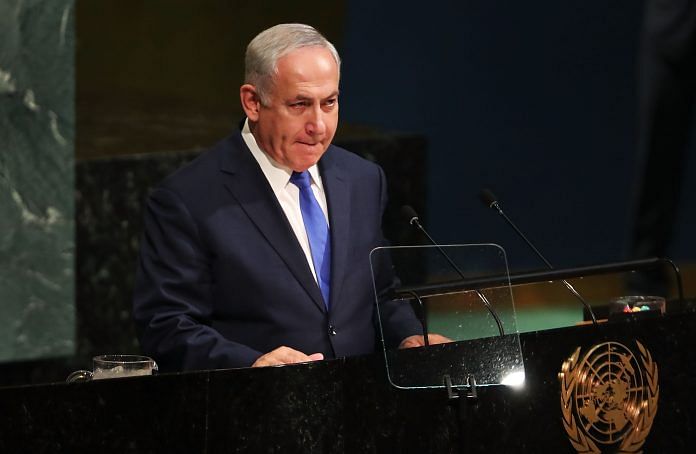Israel has been witnessing ambiguous protest rallies against corruption that were described as “more than a handful, less than a movement”, and the Catalan crisis is a tinderbox waiting to explode. And while the rest of the world might be watching the Iran-Saudi Arabia rivalry with bated breath, women have a reason to rejoice.
Netanyahu is facing the brunt of his corruption
On Saturday, a rally was called to protest against Benjamin Netanyahu’s corrupt practices. The ex-defense minister reportedly declared that corruption in Israel is a bigger threat than Iran, Hezbollah, or the Islamic State. “By implication, that made Netanyahu a greater threat than the dangers he constantly warns against,” writes Gershom Gorenberg in the Washington Post.
“And yet, despite the smaller numbers, it’s the demonstration in Jerusalem that scares Netanyahu. Last week his office reportedly pressured members of parliament from his own Likud Party and other right-wing figures not to participate. The prime minister knows that an outbreak of moral qualms in his own camp about his leadership poses the most immediate threat to his rule.”
“Since the scandal broke, Netanyahu’s mantra has been, “There was nothing, so there’ll be nothing.” That is: no crime, no police recommendation, no problem. Last week, however, he added to that message. In an angry speech to Likud activists, he implied that the police have made up their minds against him in advance, and he claimed that most police recommendations never turn into indictments.
Translation: If there’s someone with no regard for the law here, it’s the cops. They’re out to get me.”
Just the beginning for Catalonia
Spain tried to strong-arm Catalonia, which is now resulting in a stalemate that will most likely endure for some times, writes Ricard Gonzalez in Foreign Policy.
“Once it became evident that the pro-independence movement would not just go away, Rajoy chose to ignore its leaders and let the judicial system deal with any challenge to the authority of the Spanish state. As a result of this policy, the exiled Catalan president, Carles Puigdemont, is now in Brussels, and his vice president, Oriol Junqueras, is in prison. They face possible 30-year prison sentences, despite having never used violence.”
Over a 100 Spanish lawyers have stated that the charges of rebellion and sedition against them are baseless. “Yet instead of seeking a political solution for what is a political problem, Rajoy has let the conflict fester and treated it as a “law and order” problem. And by outsourcing resolution of the Catalan conflict to the judiciary, he now risks losing control of events,” writes Gonzalez.
“The most likely scenario for the foreseeable future is an entrenched conflict. Neither side seems able to “win,” and Madrid is rejecting any European Union mediation.”
“The other long-term solution would be to turn Spain into a confederation with full recognition of its national minorities. Unlike a referendum, such a shift would not create winners and losers. In private conversations, some pro-independence Catalan politicians say that they could accept it as a compromise. However, Spanish leaders do not seem ready for it; this change would force the Spanish state to rethink the way it has defined itself for the last three centuries,” he writes.
Terrible for international relations, great for feminism
“In the competition between the two regimes to earn the mantle of the more moderate Islamic alternative, women have been the beneficiaries,” writes Roya Hakakian in the New York Times.
Hakakian writes that as Iran and Saudi Arabia try to one-up each other, the policies they’re putting in place is actually beneficial for women. Mohammed bin Salman’s new, more progressive outlook is reminiscent of Iran before the 1979 revolution, and women are being uplifted in more ways than one.
“One way to view the Middle East quagmire is that it is less a byproduct of mismanaged economies or radical religious views than a problem engendered by entrenched misogyny,” Hakakian puts into perspective.
“When Saudi women earned the right to vote, drive or run for office, Iranian women did not pay much attention. Women in Iran had always enjoyed those rights, and their Saudi counterparts were simply catching up. But when Saudi Arabia lifted the ban on women’s presence in sports stadiums, Iranian women got angry at their own government. The timing of the Saudi announcement in late September was perfect — if inflaming Iran’s civil society was the goal. Only a few weeks earlier, Iranian women were barred from attending the qualifying World Cup match in Tehran between Iran and Syria, while Syrian women were permitted to enter the stadium.”
“But Iranian feminists are seeing their country’s rival do more for women’s advancement than all of Iran’s female-friendly laws have in the years since the 1979 revolution,” she writes, terming it “Saudi envy”.
“While the Saudi-Iranian hostility causes the world to worry, women have benefited. A timeless lesson proves true once again: Though governments may be enemies, sisterhood is global.”



